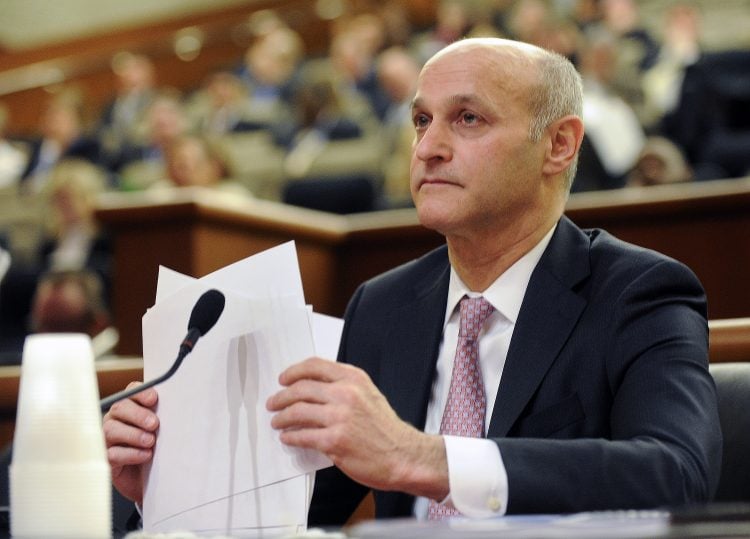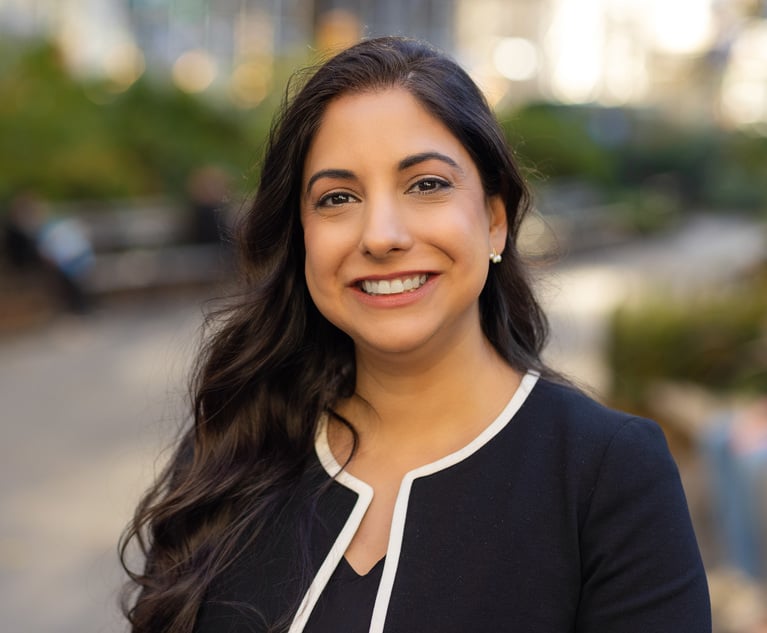Increasing Tenants' Access to Counsel Has Raised Court Efficiency, Fairness, Judges Say
The program is still in its earliest stages, which is why Chief Administrative Judge Lawrence Marks cautioned against concluding its impact less than a year after its implementation.
September 24, 2018 at 05:05 PM
6 minute read
 Chief Administrative Judge Lawrence K. Marks (Photo/Hans Pennink)
Chief Administrative Judge Lawrence K. Marks (Photo/Hans Pennink)
Progress toward universal access to counsel for tenants in New York City has led to a more fair and balanced courtroom and has—so far—not overwhelmed the city's housing courts with an influx of new litigation, judges from the city's courts testified at a public hearing in Albany on Monday.
The program is still in its earliest stages, which is why Chief Administrative Judge Lawrence Marks cautioned against concluding its impact less than a year after its start.
“If the Housing Court can't absorb that additional litigation I think we have a real problem on our hands,” Marks said.
The three-hour hearing was on access to civil legal services statewide, which New York leads on nationally. The state judiciary allocated $100 million in grants for civil legal services in its last budget.
Chief Judge Janet DiFiore presided over the hearing. Marks and the four presiding judges of the Appellate Divisions were also on the panel, including Justice Rolando Acosta of the First Department, Justice Alan Scheinkman of the Second Department, Justice Elizabeth Garry of the Third Department and Justice Gerald Whalen of the Fourth Department. New York State Bar Association president Michael Miller was also on the panel.
Most of the first hour focused on legislation signed last year by New York City Mayor Bill de Blasio to guarantee legal representation to low-income tenants in the city's housing courts. The first phase of that program started last October.
According to the city, only about 1 percent of tenants had representation in Housing Court before the law. The goal is to offer counsel for all low-income tenants in New York City, which would be a substantial increase.
“I find it hard to believe that just 1 percent of the tenants were represented by counsel and now we're looking in a few years at a large majority of tenants represented by counsel,” Marks said.
Judge Jean Schneider, the citywide supervising judge of the New York City Housing Court, said they will continue to monitor any backlog or issues with efficiency as the program continues to be phased in, but that there have not been any major problems so far. The program is scheduled to be fully implemented in 2022.
“There are a greater number of cases being referred out to trial but not a greater number of cases being tried to completion,” Schneider said. “I find that very interesting and a little reassuring that perhaps there's a little more jockeying going on to the very end.”
Schneider responded to concerns from some that greater access to counsel will increase caseloads in Housing Court and lead to backlog. Right now the program has only been implemented in 15 New York City zip codes, three in each of the five boroughs. She said an estimated 60 percent of tenants could have representation citywide when the program is fully implemented.
“I want to try to convince you today that, in fact, our court is improving by leaps and bounds,” Schneider said.
The program has improved the litigation process both in and outside the courtroom, Schneider said. There is a history in Housing Court of attorneys pressuring tenants to settle a case outside the courtroom—literally in the hallway, she said. Now, legal access attorneys are listening and referring that kind of action to the court.
“They are in the hallways working on their own cases but they pay attention to what's going on around them and they have brought forcefully to the court's attention inappropriate behavior,” Schneider said. “When we get told of this we are able to, in a forceful attitude, control it.”
There are also unforeseen, but positive, consequences to bringing more attorneys into Housing Court, said Judge Anthony Cannataro, the administrative judge of the civil courts in New York City.
Judges have spent less time explaining housing rights and the court process to tenants with representation, who may have previously gone to court without counsel, Cannataro said. Settlements are also often reached faster since both sides have an attorney to work out the details, he said.
“These are functions that are now being performed more expeditiously by the attorneys for the tenants,” Cannataro said.
Not everything is faster, but that's not necessarily a bad thing, Cannataro said. A prime example: When a case is moved to be dismissed, judges are now taking longer to decide on the motion because the legal arguments are more involved, he said.
Judges also feel like they can now take a more neutral role in cases, Cannataro said. Some may have felt they needed to act as an advocate for tenants who appear without representation against a landlord with counsel, he said. That's now changed in some cases.
“When both sides are represented by counsel, judges tell us they feel less pressured to take on the role of advocate,” Cannataro said.
A significant share of the city's housing judges have been appointed in the last few years, he said, which has made it easier to adjust to a new system where more tenants have representation. Bringing more attorneys into Housing Court has also helped with the transition. Judges have had the benefit of hearing more, varied argument, which may help them decide different cases where a tenant is not represented, Cannataro said.
“I think the judges in the Housing Court are going to learn a whole different way of conducting their cases,” Cannataro said.
New York City Bar Association president Roger Juan Maldonado testified later in the hearing that his group would like to see the same idea applied to other jurisdictions, like consumer protection cases.
“In consumer debt cases, having an attorney makes enormous difference,” Maldonado said.
The law currently covers tenants who earn 200 percent of the federal poverty level or less, though there is a proposal in the New York City Council to expand the income eligibility to twice that level.
READ MORE:
NYC Council Considering Bill to Further Expand Tenants' Right to Counsel
Is Housing Step One Toward Establishing Civil 'Gideon'?
Court Commission Pushes Changes Ahead of Housing Right to Counsel Rollout
This content has been archived. It is available through our partners, LexisNexis® and Bloomberg Law.
To view this content, please continue to their sites.
Not a Lexis Subscriber?
Subscribe Now
Not a Bloomberg Law Subscriber?
Subscribe Now
NOT FOR REPRINT
© 2025 ALM Global, LLC, All Rights Reserved. Request academic re-use from www.copyright.com. All other uses, submit a request to [email protected]. For more information visit Asset & Logo Licensing.
You Might Like
View All

Family Law Practitioners Weigh In on Court System's New Joint Divorce Program

Former NY City Hall Official Tied to Adams Corruption Probe to Plead Guilty

New Charges Expected in Sex Trafficking Case Against Broker Brothers
Trending Stories
Who Got The Work
J. Brugh Lower of Gibbons has entered an appearance for industrial equipment supplier Devco Corporation in a pending trademark infringement lawsuit. The suit, accusing the defendant of selling knock-off Graco products, was filed Dec. 18 in New Jersey District Court by Rivkin Radler on behalf of Graco Inc. and Graco Minnesota. The case, assigned to U.S. District Judge Zahid N. Quraishi, is 3:24-cv-11294, Graco Inc. et al v. Devco Corporation.
Who Got The Work
Rebecca Maller-Stein and Kent A. Yalowitz of Arnold & Porter Kaye Scholer have entered their appearances for Hanaco Venture Capital and its executives, Lior Prosor and David Frankel, in a pending securities lawsuit. The action, filed on Dec. 24 in New York Southern District Court by Zell, Aron & Co. on behalf of Goldeneye Advisors, accuses the defendants of negligently and fraudulently managing the plaintiff's $1 million investment. The case, assigned to U.S. District Judge Vernon S. Broderick, is 1:24-cv-09918, Goldeneye Advisors, LLC v. Hanaco Venture Capital, Ltd. et al.
Who Got The Work
Attorneys from A&O Shearman has stepped in as defense counsel for Toronto-Dominion Bank and other defendants in a pending securities class action. The suit, filed Dec. 11 in New York Southern District Court by Bleichmar Fonti & Auld, accuses the defendants of concealing the bank's 'pervasive' deficiencies in regards to its compliance with the Bank Secrecy Act and the quality of its anti-money laundering controls. The case, assigned to U.S. District Judge Arun Subramanian, is 1:24-cv-09445, Gonzalez v. The Toronto-Dominion Bank et al.
Who Got The Work
Crown Castle International, a Pennsylvania company providing shared communications infrastructure, has turned to Luke D. Wolf of Gordon Rees Scully Mansukhani to fend off a pending breach-of-contract lawsuit. The court action, filed Nov. 25 in Michigan Eastern District Court by Hooper Hathaway PC on behalf of The Town Residences LLC, accuses Crown Castle of failing to transfer approximately $30,000 in utility payments from T-Mobile in breach of a roof-top lease and assignment agreement. The case, assigned to U.S. District Judge Susan K. Declercq, is 2:24-cv-13131, The Town Residences LLC v. T-Mobile US, Inc. et al.
Who Got The Work
Wilfred P. Coronato and Daniel M. Schwartz of McCarter & English have stepped in as defense counsel to Electrolux Home Products Inc. in a pending product liability lawsuit. The court action, filed Nov. 26 in New York Eastern District Court by Poulos Lopiccolo PC and Nagel Rice LLP on behalf of David Stern, alleges that the defendant's refrigerators’ drawers and shelving repeatedly break and fall apart within months after purchase. The case, assigned to U.S. District Judge Joan M. Azrack, is 2:24-cv-08204, Stern v. Electrolux Home Products, Inc.
Featured Firms
Law Offices of Gary Martin Hays & Associates, P.C.
(470) 294-1674
Law Offices of Mark E. Salomone
(857) 444-6468
Smith & Hassler
(713) 739-1250






